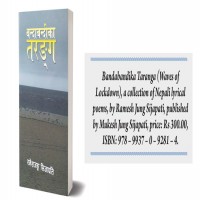Messages In Lyrical Form
Gandhi Raj Kafle
What does a poet do in a painful time? He or she has no other option but to write poems. It is within poet or poetess power. They try their best to compose poems to give sentiments an artistic expression. Here in this under review book entitled “Bandabandika Taranga", the circumstances to talk about is the coronavirus pandemic and the person who has kept himself busy in creative works to console himself is Ramesh Jung Sijapati.
The theme of the poet is mainly the adverse impact of the coronavirus. But he is not confined to it only because he has his canvass of subjects to deal with for his book. He has tried to be in the lyrical form of poetry and the values with which he has maintained connectivity in this collection are selfless good wishes in favour of truth, individual dignity, love and justice.
In each theme, the poet has allotted only twelve lines to end his expression. This creative norm might have helped the poet to write short poems. is it artistic justice to limit the size of poems this way? It depends on what kind of poem a poet is writing. In poems, where mood and expression require unbridled freedom, longer poems provide creative justice. But in lyrical form, shorter and sentimentally powerful lines create the needed influence. Poet Sijapati has chosen to be short to produce lyrics. The aim of the poet is right because it is the harmony of words, not the longer size of poems, which matters for the quality of singing.
Thus, with qualities of shortness and rhythmic value, it has been possible for the poet to accommodate as many as two hundred numbers of lyrical poems in this 232-page book. The duration of time that Sijapati chose to write, however, happens to be terrific. The poet was in 'isolation' as authorities announced a nationwide 'lockdown' to fight the pandemic. This is a serious condition, which has been reflected in the themes chosen by the poet in this anthology.
We can present a list of titles of poems, which carry grave subject matters from this anthology. They are ‘Shree Krishnako Bhakti’ (Devotion To Lord Krishna), ‘Bipatti’ (Calamities), ‘Kasari Hasnu Khai’ (How Can We Smile), ‘Aauu Sapath Khaun’ (Let’s Make Vow), ‘Nabujhindo Niyati’ (Un-understandable Fate), ‘Chandrama Chhunu Chha’ (We should touch the moon), ‘Ladnemarneko Jeet Hundaina’ (Nobody Emerge Victorious in war), ‘Dukhiya Jindagi’ (Poor Life) and ‘Manchhele Kartabya Bhulepachhi’ (When Man Forgets Duty) etc. There are more such titles, which contain serious stuff and its poetic explanations in this anthology.
Two hundred poems themselves are a huge number. The poet's love of creating short purposively to add quality of singing has provided plenty of space to bring diverse themes into the canvass of his creativity. He has written about true love, spirituality, devotion, truth, adverse impact of insincerity, poverty, favouritism, flattery, chaos of society, lack of good governance, cheating, tall talks and no delivery and crisis time failures. Certainly, these are serious kinds of stuff, which reflect the tough time and its impact on life during this horrible pandemic time.
The last poem of this anthology is entitled 'He Iswor! Prithvitala Hernus’ (Oh! God, Lookdown the Earth) is a nice example of a reflection of a painful time in the creative mind of the poet. Let’s also see the first four lines of the poem here:
He Iswor Prithvitala Hernus Sarai Kathin Bhayo
Papi Korornale Akranta Paryo Garna Samma Garyo
Chaina Kahinkatai Utsaha Kinchit Trahimam Chha Basti
Aayo Aayoko Pida Badhdo Chha Chaina Kahin Shanti
This is a prayer poem, where the composer seeks almighty God's help to fight and defeat the menace of the coronavirus. There is terror everywhere and everyone shouts 'it came and it came, but no one sees it but all is in the terrific grip of sinner virus Corona. So, the poet draws the attention of all with a spiritual solution and calls God himself to rescue all human beings from the deadly attack of the Pandemic. In gist, what can we say is that adding harmony to lift poems into singing form is a praiseworthy attempt. We often see such attempts have been made even by the Dohori song writers. They have been raising serious issues and messages sung in the Dohori songs have been effective, too. The under-review anthology, too, has its merit.
Recent News

Do not make expressions casting dout on election: EC
14 Apr, 2022
CM Bhatta says may New Year 2079 BS inspire positive thinking
14 Apr, 2022
Three new cases, 44 recoveries in 24 hours
14 Apr, 2022
689 climbers of 84 teams so far acquire permits for climbing various peaks this spring season
14 Apr, 2022
How the rising cost of living crisis is impacting Nepal
14 Apr, 2022
US military confirms an interstellar meteor collided with Earth
14 Apr, 2022
Valneva Covid vaccine approved for use in UK
14 Apr, 2022
Chair Prachanda highlights need of unity among Maoist, Communist forces
14 Apr, 2022
Ranbir Kapoor and Alia Bhatt: Bollywood toasts star couple on wedding
14 Apr, 2022
President Bhandari confers decorations (Photo Feature)
14 Apr, 2022











